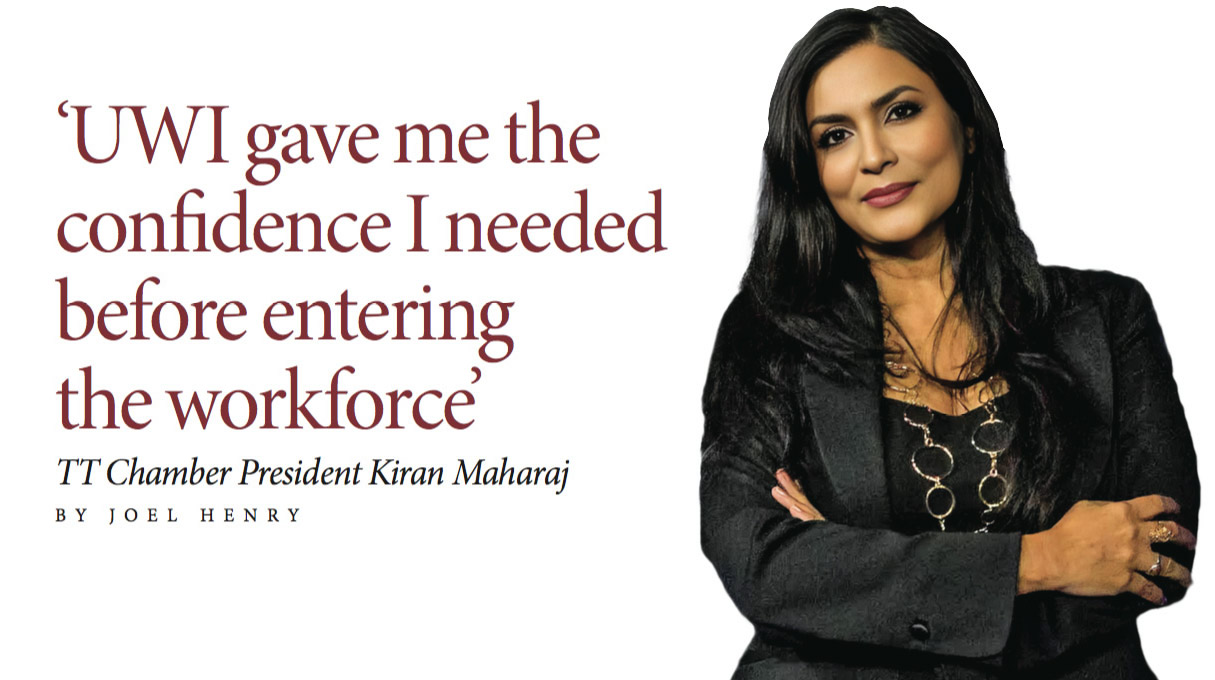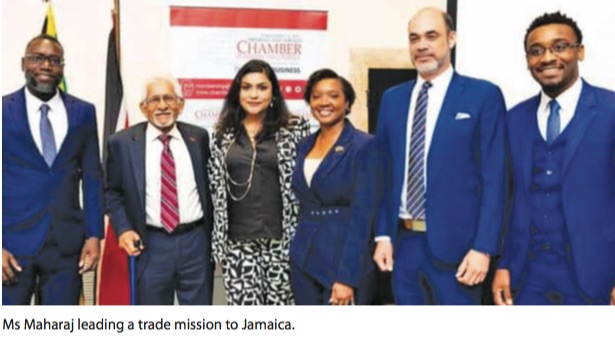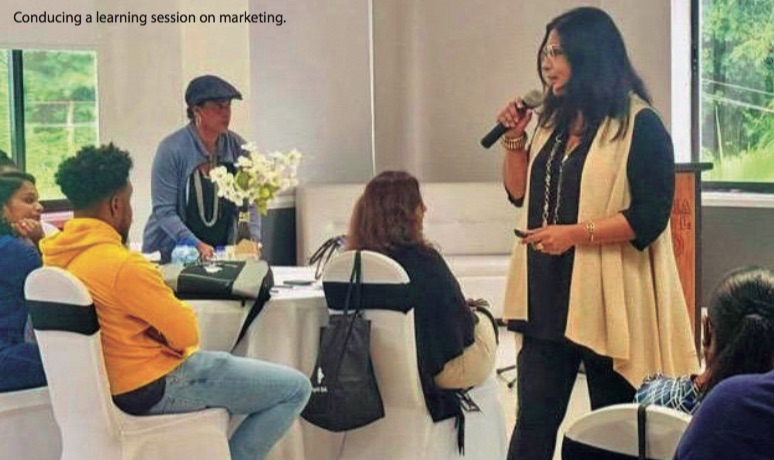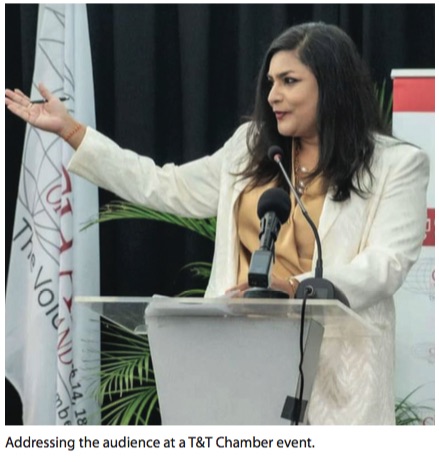
Kiran Maharaj surprised me.
She is the current President of the T&T Chamber of Industry and Commerce, and past president of both the T&T Publishers’ and Broadcasters’ Association and the Greater Tunapuna Chamber of Industry and Commerce. She is also the Managing Director of Caribbean Lifestyle Communications, a company made up of several radio stations (including Heartbeat Radio 104.1 FM, the world’s first radio station for women), and a film/video production and distribution company.
So I expected our interview to be laser-like in its focus on business. Far from it.
“I wanted to be a poet,” she tells me of her earliest ambitions.
And though her father (film magnate Anthony Maharaj) dissuaded her from following this passion because of its limited economic viability, it is clear in our conversation, and in the path of her career, that she approaches life and business with somewhat of a poet’s sensibilities.
During her tenure as chamber president (she was appointed in April 2023) she has shown herself to be a focused and effective representative for the local business community. But beyond that, and in our interview, Maharaj expresses, with great eloquence, views on Caribbean identity, collective solutions for national and regional challenges, and a passion for life-long learning.
Among the centres of learning she attended is UWI St Augustine, where she completed her undergraduate degree.
“I don’t even want to say ‘wonderful' because it sounds like I am underrating my experience,” she says of her time at the St Augustine campus. “It really gave me the confidence I needed as a young person before entering the workforce.”
UWI’s relationship with leaders in the business community are perhaps more important than they have ever been as the university progresses its “Revenue Revolution”, the second phase of a strategic plan focused on income generation and improved self-sustainability. Partnerships with both the private sector and government are crucial for its success, as well as campus-grown commercial projects.
So what can the university do to better serve the business community? Ms Maharaj has thoughts, particularly in the areas of preparing graduates for their professional lives and research for commercial purposes.
“The ways of the world I learned from my father, and humility and heart I learned from my mother,” Maharaj tells me of her formative years.
She grew up in Chaguanas, the eldest of three girls to their parents. And though the family unit was just five, they were also very close to their extended family.
“I think the role of women in my family influenced me,” she says. “On my dad’s side, my grandmother was a single mother of four and raised her kids mainly on her own, from very humble beginnings. On my mom’s side my grandparents also came from very humble beginnings.
“Among my aunts and even with my grandmother, I saw how they were able to balance their work and family lives. That gave me a very good grounding.”

Her mother worked with her father in his business, but she was “the ideal mummy”, she says.
“When you think of what a mummy should be, I was very fortunate.”
And though her father might not have been in favour of her career aspirations as a poet, he did have a love for the creative arts that he was able to successfully integrate into his entrepreneurial vision. The Maharaj family are film distributors and producers. Anthony Maharaj has also written screenplays and directed numerous films.
“Daddy is a true entrepreneur,” she says. “I remember he mortgaged his house and took the money and went out there (internationally) with a script. You have to have guts to do that. And he made it. His first feature film for the international market turned into 16 feature films.”
That urge to adventurism and capacity for work is evident throughout Maharaj’s own life, all the way back to her UWI days. She studied literature with a minor in political science. At the same time, she was earning her certificate in marketing from the School of Accounting (SAM) and Management.
Apart from her studies, she worked on the UWI Student Guild paper as a member of their Publication Committee and did extracurricular activity with her classmates in SAM’s marketing programme. When she wasn’t at school, she edited the Trinidad Express’s cultural magazine.
“I like to keep busy,” she laughs. “I love learning. Even now, if I see something and I’m interested in it, I will do the course.”
Despite her schedule, she did still find time to enjoy her student days. In fact, when she speaks of her time at the St Augustine campus, this is what she emphasises.
“Although I had so much going on, I had a great time at UWI. I think that was important, to be able to enjoy yourself while you are going to school – whether it was through the extra-curricular activities, meeting your secondary school friends in other faculties, and meeting students from other islands,” she recalls.
She also speaks about the opportunities for development UWI gave her such as “using the student services to get a job, using the campus pool, going to the cricket matches”, and the importance of taking advantage of them.
Among the most important relationships she formed on campus was one with a petroleum engineering student. “He was my best friend,” she says. He would eventually be the father of her son.
“I have a fantastic son,” she says. “He is brilliant. He is the ideal gentleman.”
Laughing, she adds, “maybe I should thank UWI for that as well.”

Her professional life has been just as full. Her first official “job” was as a trainee reporter at the Trinidad Newsday under the leadership of revered journalist Therese Mills. She loved the profession, but she had the blood of an entrepreneur as well. She graduated to reporter, then producer and programme developer for radio before her family eventually acquired the radio stations.
“I always wanted to do journalism. I was really influenced by hearing the stories that I felt were not told sufficiently and that the world did not hear about,” she explains, referring to the stories of the Global South.
So she set out to tell those stories - as a journalist and managing director of a media house. This includes her time as a freelance journalist for CNN World Report covering the region, and the opportunity to take part in a leadership programme of the Washington-based National Association of Broadcasters (a rare accomplishment for someone not born in the US).
And as president of the T&T Chamber she represents local business, “telling their story” through advocacy, but also the interests of our society through the entities with great responsibility for its economic well-being. It is important to recognise that being a business person and representing the business community are two different roles, the second one much more about the collective interest.
“I never aspired to be in any of the roles I ascended to,” she says of her positions as a leader of chambers and associations, and a member of boards. But she did accept them, and served dutifully.
“For me,” she explains, “my legacy is not going to be in the house I have or the size of my bank account. My legacy is going to be in what I gave back to my society.”
In fact, to Maharaj, the two main problems affecting the business community are problems for all of T&T - the urgent need to improve the ease of doing business, and crime.
“Ease of doing business is multi-pronged,” she says. “But there are simple things that we should be able to do online. And although we are in the process of digitisation and digital transformation, to me and to many business people, we are not getting there fast enough.”
Crime, she says, is “more of a puzzle” with many pieces and requiring the involvement of many groups throughout the society to solve:
“Crime is not just about the stealing and the murders. Crime is about corruption. It is about fraud. They all interplay and interlock with each other. I don’t see the stakeholders coming together regularly. I don’t see a council of civil society organisations, business organisations, and government officials.”
And what of the university? What can The UWI do to respond to the needs of the private sector? The T&T Chamber president has several suggestions. The first is to be more proactive in recognising the high-demand jobs and structuring programmes to prepare graduates for them.
“I made the point that our government did a wonderful job in giving free education,” she says, “but we are overrun by doctors, lawyers, and engineers, and we are severely lacking in many other disciplines.”

Another area is preparing graduates for the world of work. Maharaj would like to see more students take part in internships and other programmes to make their transition from campus to professional life smoother (it should be noted that UWI St Augustine’s Division of Student Services and Development does great work in this area through departments like Careers, Co-Curricular and Community Engagement and programmes such as World of Work).
She would also like to see more students and graduates engaged in business-driven data and research.
Interestingly, the areas she points out in higher education, like crime, all need closer partnerships to improve, especially between the university, the private sector, and government. It makes sense, the pathway of her career is simultaneously guided, girded, and measured by the success of people working together.
She says, “This road that I have travelled, and many other people have travelled, has not been easy. It has had its failures. You fall many times. What you have to have is a sense of purpose, self-worth, and confidence.”
And to students who, like her, will graduate and be required to make their way as professional, entrepreneur, or maybe even poet, she adds, “expect the falls, expect the failures, but strive for success knowing that you are being true to yourself, and true to others, and acting in the highest good.”